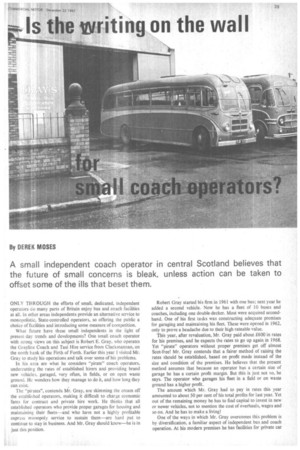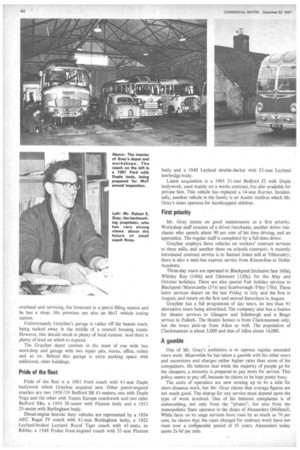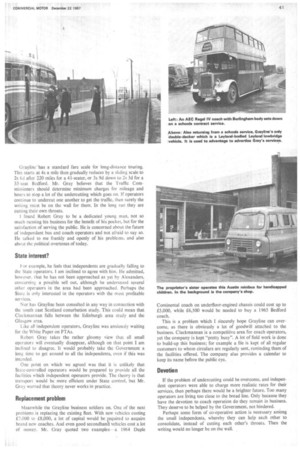the writing on the wall
Page 41

Page 42

Page 43

If you've noticed an error in this article please click here to report it so we can fix it.
By DEREK MOSES
A small independent coach operator in central Scotland believes that the future of small concerns is bleak, unless action can be taken to offset some of the ills that beset them.
ONLY THROUGH the efforts of small, dedicated, independent operators do many parts of Britain enjoy bus and coach facilities at all. In other areas independents provide an alternative service to monopolistic, State-controlled operators, so offering the public a choice of facilities and introducing some measure of competition.
What future have these small independents in the light of present-day trends and developments? One small coach operator with strong views on this subject is Robert E. Gray, who operates the Grayline Coach and Taxi Hire service from Clackmannan, on the north bank of the Firth of Forth. Earlier this year I visited Mr. Gray to study his operations and talk over some of his problems.
In his area are what he considers "pirate" coach operators, undercutting the rates of established hirers and providing brand new vehicles, garaged, very often, in fields, or on open waste ground. He wonders how they manage to do it, and how long they can exist.
The "pirates", contends Mr. Gray, are skimming the cream off the established operators, making it difficult to charge economic fares for contract and private hire work. He thinks that all established operators who provide proper garages for housing and maintaining their fleets—and who have not a highly profitable express monopoly service to sustain them—are hard put to continue to stay in business. And Mr. Gray should know—he is in just this position. Robert Gray started his firm in 1961 with one bus; next year he added a second vehicle. Now he has a fleet of 10 buses and coaches, including one double-decker. Most were acquired secondhand. One of his first tasks was constructing adequate premises for garaging and maintaining his fleet. These were opened in 1962, only to prove a headache due to their high rateable value.
This year, after revaluation, Mr. Gray paid about £600 in rates for his premises, and he expects the rates to go up again in 1968. Yet "pirate" operators without proper premises get off almost Scot-free! Mr. Gray contends that a fairer method of raising the rates should be established, based on profit made instead of the size and condition of the premises. He believes that the present method assumes that because an operator has a certain size of garage he has a certain profit margin. But this is just not so, he says. The operator who garages his fleet in a field or on waste ground has a higher profit.
The amount which Mr. Gray had to pay in rates this year amounted to about 50 per cent of his total profits for last year. Yet out of the remaining money he has to find capital to invest in new or newer vehicles, not to mention the cost of overhauls, wages and so on. And he has to make a living!
One of the ways in which Mr. Gray overcomes this problem is by diversification, a familiar aspect of independent bus and coach operation. At his modern premises he has facilities for private car overhaul and servicing, his forecourt is a petrol filling station and he has a shop. His premises are also an MoT vehicle testing station.
Unfortunately Grayline's garage is rather off the beaten track, being tucked away in the middle of a council housing estate. However, this should result in plenty of local custom. And there is plenty of land on which to expand.
The Grayline depot consists in the main of one wide bay workshop and garage with two repair pits, stores, office, toilets and so on. Behind this garage is extra parking space with additional, older buildings.
Pride of the fleet
Pride of the fleet is a 1961 Ford coach with 41-seat Duple bodywork which Grayline acquired new. Other petrol-engined coaches are two 1958/59 Bedford SB 41-seaters, one with Duple Vega and the other with Yeates Europa coachwork and two older Bedford SBs, a 1954 38-seater with Plaxton body and a 1953 33-seater with Burlingham body.
Diesel-engine heavier duty vehicles are represented by a 1954 AEC Regal IV coach with 41-seat Burlingham body, a 1952 Leyland-bodied Leyland Royal Tiger coach with 41-seats, ex Ribble, a 1948 Foden front-engined coach with 33-seat Plaxton body and a 1948 Leyland double-decker with 53-seat Leyland lowbridge body.
Latest acquisition is a 1965 21-seat Bedford J2 with Duple bodywork, used mainly on a works contract, but also available for private hire. This vehicle has replaced a 14-seat Karrier. Incidentally, another vehicle in the family is an Austin minibus which Mr. Gray's sister operates for handicapped children.
First priority
Mr. Gray insists on good maintenance as a first priority. Workshop staff consists of a driver /mechanic, another driver /mechanic who spends about 90 per cent of his time driving, and an apprentice. The regular staff is completed by a full-time driver.
Grayline employs three vehicles on workers' contract services to three mills, and another three on schools contracts. A recently introduced contract service is to Samuel Jones mill at Tillicoultry; there is also a mini-bus express service from Kincardine to Dollar Academy.
Three-day tours are operated to Blackpool (inclusive fare 160s), Whitley Bay (140s) and Glenmore (120s), for the May and October holidays. There are also special Fair holiday services to Blackpool /Morecambe (57s) and Scarborough /Filey (70s). These latter services depart on the last Friday in July and the first in August, and return on the first and second Saturdays in August.
Grayline has a full programme of day tours, no less than 91 alternative tours being advertised. The company also has a licence for theatre services to Glasgow and Edinburgh and a Bingo service to Falkirk. The theatre licence is from Clack mannan only, but the tours pick-up from Alloa as well. The population of Clackmannan is about 3,000 and that of Alloa about 14,000.
A gamble
One of Mr. Gray's ambitions is to operate regular extended tours work. Meanwhile he has taken a gamble with his other tours and excursions and charges rather higher rates than some of his competitors. He believes that while the majority of people go for the cheapest, a minority is prepared to pay more for service. This policy seems to pay off, because he claims to be kept pretty busy.
The costs of operation are now coming up to 4s a mile for short-distance work, but Mr. Gray claims that average figures are not much good. The charge for any service must depend upon the type of work involved. One of his bitterest complaints is of undercutting, not only from the "pirates", but also from the monopolistic State operator in the shape of Alexanders (Midland). While fares on its stage services have risen by as much as 70 per cent, he claims thia the rates charged for contract work have not risen over a cothiarable period of 10 years. Alexanders today quote 2s bd per mile. Grayline ' has a standard fare scale for long-distance touring. This starts at 4s a mile then gradually reduces by a sliding scale to 2s 6d after 220 miles for a 41-seater, or 3s 9d down to 2s 3d for a 33-seat Bedford. Mr. Gray believes that the Traffic Commissioners should determine minimum charges for mileage and hours to stop a lot of the undercutting which goes on. If operators continue to undercut one another to get the traffic, then surely the writing must be on the wall for them. In the long run they are cutting their own throats.
I found Robert Gray to be a dedicated young man, not so much running his business for the benefit of his pocket, but for the satisfaction of serving the public. He is concerned about the future of independent bus and coach operators and not afraid to say so. He talked to me frankly and openly of his problems, and also about the political overtones of today.
State interest?
For example, he feels that independents are gradually falling to the State operators. I am inclined to agree with him. He admitted, however, that he has not been-approached as yet by Alexanders, concerning a possible sell out, although he understood several other operators in the area had been approached. Perhaps the State is only interested in the operators with the most profitable services.
Nor has Grayline been consulted in any way in connection with the south east Scotland conurbation study. This could mean that Clackmannan falls between the Edinburgh area study and the Glasgow area.
Like all independent operators, Grayline was anxiously waiting for the White Paper on PTAs.
Robert Gray takes the rather gloomy view that all small operators will eventually disappear, although on that point I am inclined to disagree. It would probably take the Government a lone time to get around to all the independents, even if this was intended.
One point on which we agreed was that it is unlikely that State-controlled operators would be prepared to provide all the facilities which independent operators provide. The theory is that transport would be more efficient under State control, but Mr. Gray warned that theory never works in practice.
Replacement problem Meanwhile the Grayline business soldiers on. One of the next problems is replacing the existing fleet. With new vehicles costing £7,000 to £.8,000, a lot of capital would be required to acquire brand new coaches. And even good secondhantl vehicles cost a lot of money. Mr. Gray quoted two examples---a 1964 Duple Continental coach on underfloor-engined chassis could cost up to £5,000, while £6,500 would be needed to buy a 1965 Bedford coach.
This is a problem which I sincerely hope Grayline can overcome, as there is obviously a lot of goodwill attached to the business. Clackmannan is a competitive area for coach operators, yet the company is kept "pretty busy". A lot of field work is done to build-up this business; for example a file is kept of all regular customers to whom circulars are regularly sent, reminding them of the facilities offered. The company also provides a calendar to keep its name before the public eye.
Devotion If the problem of undercutting could be overcome, and independent operators were able to charge more realistic rates for their services, then perhaps there would be a brighter future. Too many operators are living too close to the bread line. Only because they have the devotion to coach operation do they remain in business. They deserve to be helped by the Government, not hindered.
Perhaps some form of co-operative action is necessary among the small independents, whereby they can help each other to consolidate, instead of cutting each other's throats. Then the writing would no longer be on the wall.




















































































